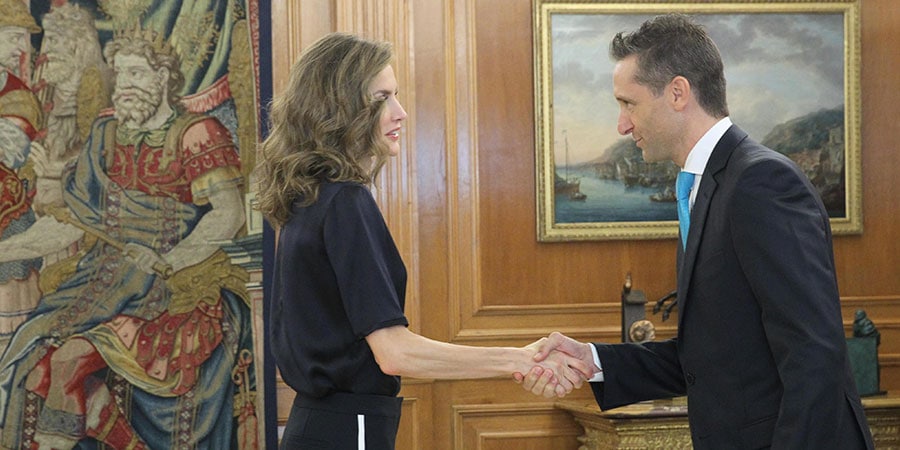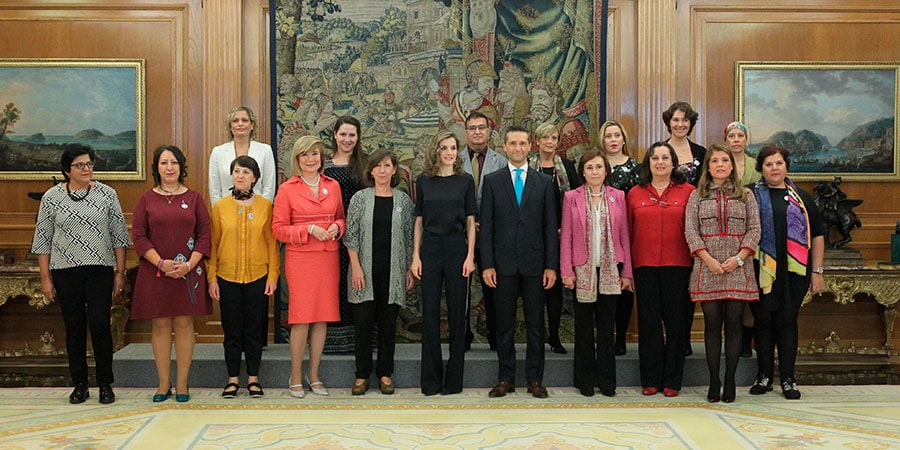
The importance of giving gynecologic cancer a voice together with Queen Letizia.
A little over two years ago, we were received in La Zarzuela Palace by Queen Letizia. We went there to join the Association of Women Suffering from Ovarian and Gynecologic Cancer (ASACO) led by their president Mrs. Charo Hierro and the entire directive commission team, and affected patients who belong to the association. I have had the great fortune of joining and collaborating with the association as a professional adviser since it started, in 2010.
I remember that in that opportunity, we were received by Her Majesty Queen Letizia to whom we expressed the current situation of gynecologic cancer in Spain along with all the projects and future challenges of the Association itself, as well as the upcoming research advances.
 The importance of giving gynecologic cancer a voice together with Queen Letizia and the Spanish Association of Women Suffering from Ovarian and Gynecologic Cancer (ASACO)
The importance of giving gynecologic cancer a voice together with Queen Letizia and the Spanish Association of Women Suffering from Ovarian and Gynecologic Cancer (ASACO)
President Charo Hierro along with the entire directive commission group and patients were able to express, not only the Association’s initiatives destined to give voice to ovarian and gynecologic cancer in the population, but also to the projects destined to give psychological and emotional support to affected patients, creating a safe space for patients as well as their relatives. The Queen rapidly noticed it is a very active association and is constantly growing.
We were able to explain that cervical cancer has an effective preventive measure which is performing cervical cytology regularly. Also, more than a decade ago, the vaccination of girls against the virus that produces cervical cancer, human papillomavirus, started. Fortunately in Spain, the incidence of cervical cancer is low because women usually visit their Gynecologist to undertake periodic pap smears. However, this remains outside of any specific preventive program leaving it up to the women. That is why, although rare, cervical cancer cases are still seen, some of which are in advanced stages. Today, some autonomous communities such as Navarra, are already implementing preventive campaigns for the population to perform cervical cytology routinely in women between the ages of 26 and 65. When this is mirrored by other autonomous communities and when the effects of vaccination of girls are noticed, 20-30 years from now, cervical cancer will become anecdotal in Spain.
Ultimately, we were able to explain the current situation of ovarian cancer. It is a type of cancer diagnosed in advanced stages in 80% of cases, that gives non-specific symptoms such as swelling or abdominal pain, early satiety after meals, or bowel rhythm changes, among others. We wanted to emphasize that, today, the main treatment strategy is addequately performed surgery by Gynecologic Oncologists with enough training. This is why we revealed the importance of affected women attending specialized professionals who work in multidisciplinary teams to offer the best cure odds to these patients.
In essence, it was a very pleasant and nurturing encounter for everybody. The Queen showed a lot of interest in the current problem situation and all of the Association’s active programs. She was open to helping and joining any initiative and we were thankful for her support and encouragement to keep working to help women diagnosed with gynecologic and ovarian cancer.

![[:es]Telemedicina Médico remoto en España NOTICIA[:]](https://drlucasminig.com/en/wp-content/uploads/telemedicina-medico-remoto-doctor-espana-lucas-minig.jpg)
![[:es]La quimioterapia hipertérmica intraperitoneal (HIPEC), no es útil en mujeres con cáncer de ovario[:]](https://drlucasminig.com/en/wp-content/uploads/quimioterapia-hipertermica-intraperitoneal-no-util-cancer-de-ovario.jpg)
![[:es]Vacuna Contra VPH reduce cáncer de útero[:]](https://drlucasminig.com/en/wp-content/uploads/vacuna-contra-vph-noticias-dr-lucasminig.jpg)
![[:es]Investigan cómo prevenir el cáncer de ovario. Doctor Lucas Minig[:]](https://drlucasminig.com/en/wp-content/uploads/prevenir-cancer-de-ovario-mujeres-con-alto-riesgo-drlucasminig-investigacion.jpg)
